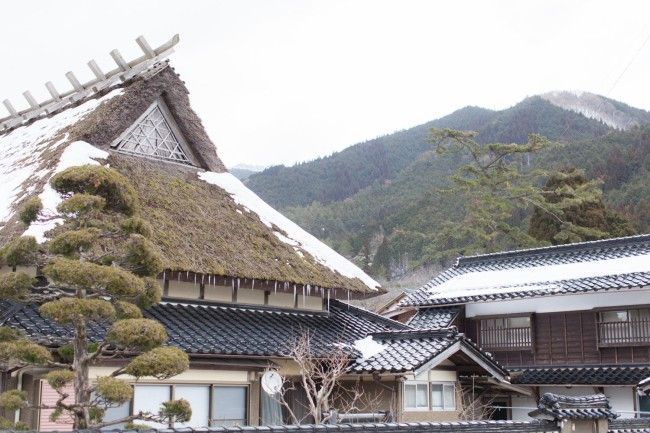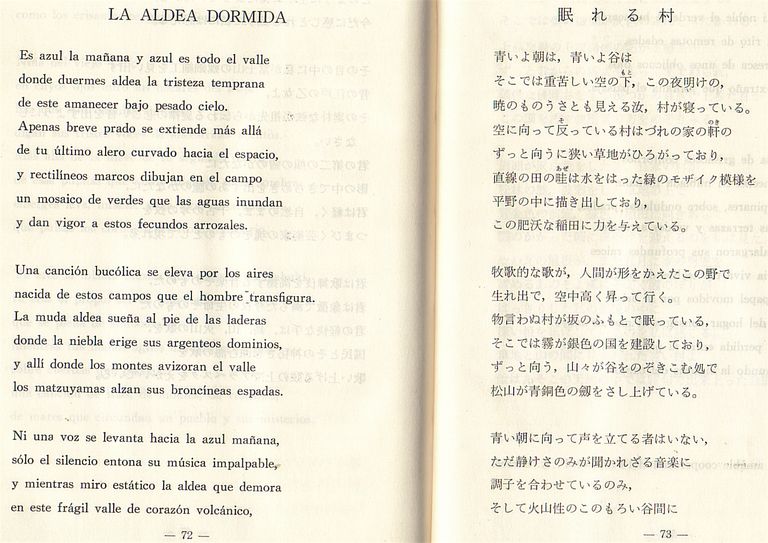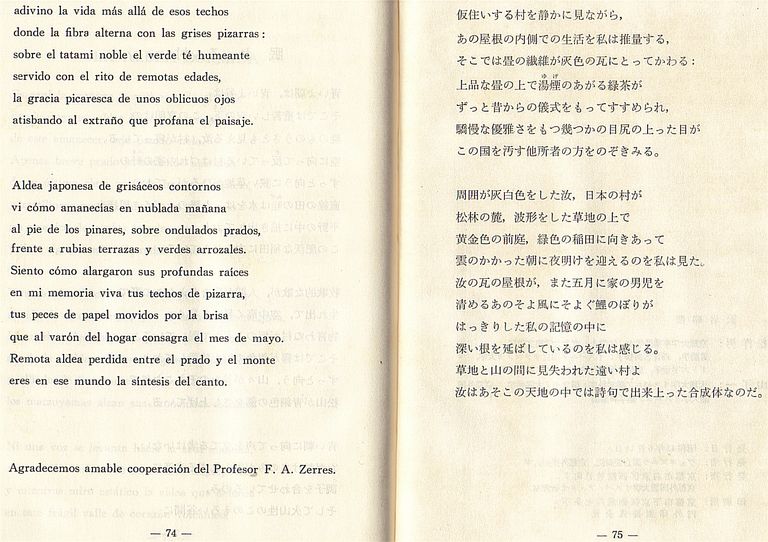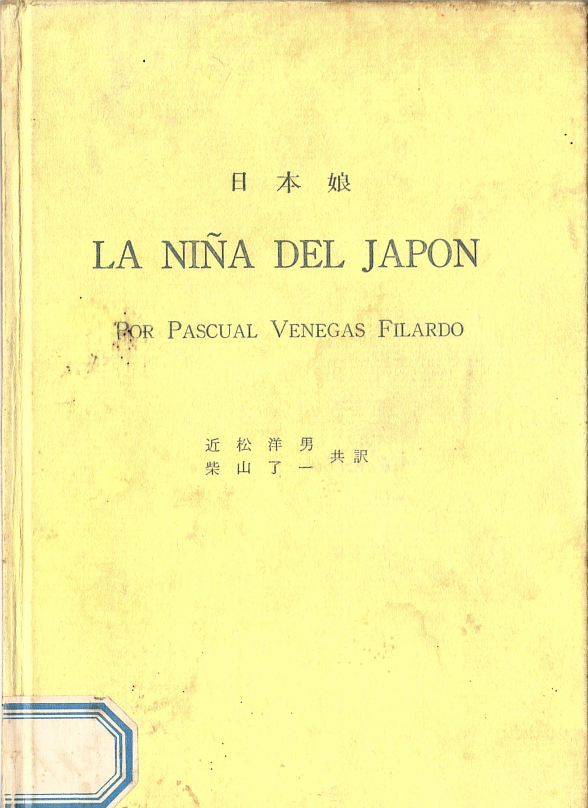I must clarify that the English translation of the poems, originally in Spanish and Japanese, have the terrible weakness that they are simple literal translations, lacking the necessary poetic reworking to adjust the metric, rhyme and cadence that they have in their original languages .
Despite that, the best possible work has been done within my limited capabilities and I hope that publicizing the translation of this work will be of benefit to all.

Source
English: |
The Sleeping VillageThe morning is blue and the whole valley is bluewhere you sleep village the early sadness of this dawn under heavy skies. Just a short meadow extends beyond of your last eaves curved into space, and rectilinear frames draw in the field a mosaic of greens that the waters flood and they give vigor to these fertile rice fields. A bucolic song rises through the air born of these fields that man'transfigures. The silent village dreams at the foot of the slopes where the mist builds its silvery dominions, and where the mountains look out over the valley the matzuyamas raise their bronze swords. Not a voice rises to the blue morning only silence sings its impalpable music, and while I stare at the village that lingers in this fragile valley of volcanic heart, I guess life beyond those roofs where the fiber alternates with the gray slates: on the noble tatami the smoky green served with the rite of remote ages, the picaresque grace of oblique eyes peering at the stranger who desecrates the landscape. Japanese village of grayish contours I saw how you woke up on a cloudy morning at the foot of the pine groves, on rolling meadows, in front of blond terraces and green rice fields. I feel how they lengthened their deep roots in my memory live your slate roofs, your paper fish moved by the breeze that consecrates the month of May to the male of the home. Remote village lost between the meadow and the mountain you are in that world the synthesis of the song. |
Spanish: |
La Aldea DormidaEs azul la mañana y azul es todo el valledonde duermes aldea la tristeza temprana de este amanecer bajo pesado cielo. Apenas breve prado se extiende más allá de tu último alero curvado hacia el espacio, y rectilíneos marcos dibujan en el campo un mosaico de verdes que las aguas inundan y dan vigor a estos fecundos arrozales. Una canción bucólica se eleva por los aires nacida de estos campos que el hombre'transfigura. La muda aldea sueña al pie de las laderas donde la niebla erige sus argénteos dominios, y allí donde los montes avizoran el valle los matzuyamas alzan sus broncíneas espadas. Ni una voz se levanta hacia la azul mañana, sólo el silencio entona su música impalpable, y mientras miro estático la aldea que demora en este frágil valle de corazón volcánico, adivino la vida mas allá de esos techos donde la fibra alterna con las grises pizarras: sobre el tatami noble el verde humeante servido con el rito de remotas edades, la gracia picaresca de unos oblicuos ojos atisbando al extraño que profana el paisaje. Aldea japonesa de grisáceos contornos vi cómo amanecías en nublada manana al pie de los pinares, sobre ondulados prados, frente a rubias terrazas y verdes arrozales. Siento cómo alargaron sus profundas raíces en mi memoria viva tus techos de pizarra, tus peces de papel movidos por la brisa que al varón del hogar consagra el mes de mayo. Remota aldea perdida entre el prado y el monte eres en ese mundo la síntesis del canto. |
Japanese: |
眠れる村靑いよ朝は,靑いよ谷はそこでは重苦しい空の¥,この夜!けの, 暁のものうさとも見える汝,村が寝っている。 空に向って轰っている村はづれの家の鋅の ずっと向うに狭い草地がひろがっており, 直線の田の畦は水をはった緑のモザイク模様を 平野の中に描き出しており, この肥沃な稲田に力を与えている。 牧歌的な歌が,人間が形をかえたこの野で 生れ出で,空中高く昇って行く。 物言わぬ村が坂のふもとで眠っている, そこでは霧が銀色の国を建設しており, ずっと向う,山々が谷をのぞきこむ処で 松山が青銅色の劎をさし上げている。 青い朝に向って声を立てる者はいない, ただ静けさのみが聞かれざる音楽に 調子を合わせているのみ, そして火山性のこのもろい谷間に 仮住いする村を静かに見ながら, あの屋根の内側での生活を私は推;IIする, そこではSの幽維が灰色の瓦にとってかわる: 上品な®の上でのあがる緑茶が ずっと昔からの儀式をもってすすめられ, 驕慢な®雅さをもつ幾つかの目尻の上った目が この国を汚す他所者の方をのぞきみる。 周囲が灰闰色をした汝,日本の村が 松林の雜,波形をした草地の上で 黄金色の前庭,緑色の稲田に向きあって 雲のかかった朝に夜明けを迎えるのを私は見た。 汝の瓦の屋根が,また五月に家の男児を 淸めるあのそよ風にそよぐ鲤のぼりが はっきりした私の記協の中に 深い根を延ばしているのを私は感じる。 草地と山の冏に見失われた遠い村よ 汝はあそこの天地の中では詩句で出来上った合成体なのだ。 |
Due to very different circumstances, I found myself with a book that I had saved, it is a somewhat peculiar poetry book in my library, since it is the bilingual edition in Spanish and Japanese of the Venezuelan poet Pascual Venegas Filardo. The work was published for the first time in 1961, but this one I have here is the 1968 edition, published in Kyoto by Gaikokugo Daigaku and consists of 76 pages, bound in hardcover.
The foreword to this book of poems was written by the Venezuelan Ambassador to Japan, J. M. Pérez Morales. In fact, what is most curious to me is that the book I have was from the embassy library ... don't go after me with the excommunication order for stealing books, I really didn't! I think the book was disincorporated or something similar, and then it passed through several hands until it came to me.
I have, to some extent, some affinity with some traits of Eastern cultures, there are several things that I like and in recent times I dusted off a few of them. I thought about checking if the book was available to share, but I only found fragments online, hence the idea of digitizing it and applying OCR to it to share it as it is in print, in both languages. Later on a suggestion from a reader, I decided to translate it into English, even if it is just to give an idea of what the beautiful poems in this book want to express.
Sources:




Mucho más que un navegador. Disfruta de una navegación privada, segura y rápida con Brave